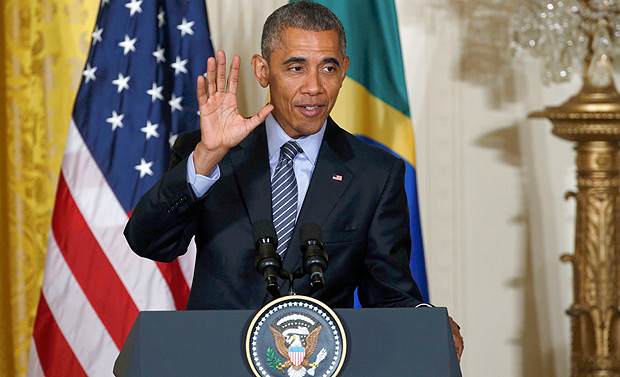Defrosting US-Brazilian Relations
 Kevin Lamarque / Reuters
Kevin Lamarque / Reuters
A layer of frost settled on US-Brazil relations in 2013 after Edwardo Snowden exposed intrusive US spying on Brazil. An object of surveillance herself, President Rousseff abruptly called off a scheduled visit to Washington. Two years later, in June 2015, Rousseff finally traveled to the US Capital to try to patch up the damage. Her trip was a promising step toward getting the bilateral relationship back on track, but it was overwhelmed by the deepening crises at home.
Today, Rousseff has been replaced temporarily by her vice president, Michel Temer, while the Senate debates whether to impeach and permanently remove her from office. The economy remains depressed, and congress has been thrown into turmoil by the country’s spreading corruptions scandals. US-Brazil relations, although cordial and correct, are effectively frozen. The two countries barely engage one another.
Brazil’s deep and complex domestic troubles are reason enough for the US to exercise caution in dealing with the country. Although Rousseff’s impeachment has followed constitutional norms, many in Brazil and worldwide doubt the legitimacy of the proceedings. There are valid concerns about the seriousness of the charges and the fairness of a verdict emerging from the many scandal-tainted, unscrupulous politicians sitting in judgment of her. Compared to them, she seems honest and clean.
The US is unlikely to embrace the Temer administration while Rousseff retains any chance of returning to power. Washington wants to stand clear of Brazil’s internal political battles. But even after the impeachment question is resolved, the US could remain wary of aligning itself closely with a Brazilian government of dubious legitimacy—whether led by Temer or Rousseff. Polls indicate that few Brazilians want either of them as president. The two months old Temer’s government has already been disparaged by his choice of an all white, all male cabinet in one of the world’s most diverse nations, and by the fact that three of his ministers have had to resign in the face of corruption charges.
Without new elections, whoever occupies the presidential palace for the next two years will be governing without much enthusiasm or popular support, while a relentless array of economic, social, and security problems buffet the nation. For the time being, Brazil is not an inviting setting for any major US engagement.
With the US likely to remain cautious and soon to be caught up in its own the transition to a new government, it is Brazil that will have to take the initiative to revive the passive bilateral relationship. In seeking to repair Brazil’s broken economy, both the Rousseff and Temer governments have called for stronger commercial ties with the US—an objective that is surely worth pursuing. It can only happen if Brazil is prepared to lift many long-standing protectionist obstacles and broadly open the country’s economy. It also needs to figure out how to deal with the floundering Mercosul customs union. With the growing support of its business community, there are encouraging signs that Brazil is increasingly ready to make needed changes. The US, too, however, will have to be convinced to alter some of its trade policies.
The US would welcome greater Brazilian cooperation in addressing critical regional issues. US officials know that, while Brazil is on the sidelines, there is not much that Washington or other governments can do to resolve the deep crises threatening Venezuela. Similarly, Brazil, with its longstanding, close relations with Cuba, could help advance US reconciliation efforts. Without Brazilian support, not much can be done to reverse the atrophy of the Organization of American States (OAS), and make it more effective in advancing democracy and human rights. For many years, however, Brazil and the US have not been able to find sufficient common ground to collaborate on these issues.
The challenge for the two nations is similar to what it has been for several decades. Improved communication is needed to probe the many disagreements and identify shared interests. More needs to do more to set a cooperative tone for the relationship, and identify a few priority themes—economic and energy issues, for example, or key regional problems--that can lead to more intensive engagement. None of this can happen until Brazil has a permanent president whose legitimacy to govern is widely accepted. Unhappily for both countries, that may have to wait for new elections in 2018.



















